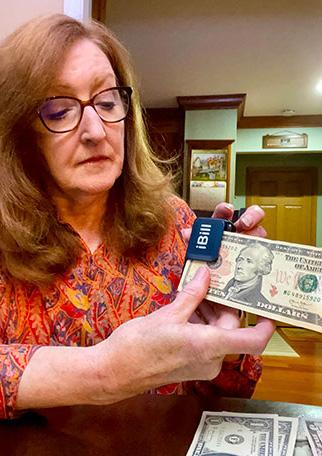
10 minute read
On the Record
from MidWeek_060921
by Shaw Media
... with Susan Dalton
Who would you like to see go on the record? Let us know at readit@midweeknews.com
DeKALB – For many, using U.S. currency is easy, an everyday task taken for granted. For people with visual impairments, telling a $5 bill from a $10, or a $20 bill from a $100, can be impossible.
To help people with visual impairments differentiate currency, the U.S. Department of the Treasury’s Bureau of Engraving and Printing is distributing free electronic bill readers. The readers, called iBill devices, were first released in January 2015. To date, more than 82,000 iBills have been distributed to eligible U.S. citizens and legal residents.
Through the work of Susan Dalton, Northern Illinois University is now a distribution location of the iBill.
Dalton is an adjunct instructor in NIU’s College of Education, in the department of Special and Early Education. She contacted the treasury to request devices to use in one of her classes, which led to an invitation for NIU to become a federal iBill distribution site.
To apply for a free iBill through NIU, complete the online form at www.moneyfactory.gov/uscurrencyreaderform.html and then email the PDF to Dalton at sdalton@niu.edu.
Dalton spoke to MidWeek reporter Katrina Milton about the iBill and how it helps visually impaired people have more independence.
Milton: What is the iBill?
Dalton: The iBill is a small electronic device created by the U.S. Department of the Treasury’s Bureau of Engraving and Printing. It is a small device, similar in size to a car remote fob. If you slide a dollar bill into it, it will vocally announce the bill’s denomination or it will beep. You can also set it to a vibrating mode for privacy or to help people who are both deaf and blind. It’s very simple and easy to use.
Milton: How can people apply for and receive an iBill?
Dalton: People can get the iBill directly from the treasury online at www.BEP.gov. NIU is a distributor of the iBill. Anyone in the U.S. that is a legal resident or citizen can apply for an iBill and receive one for free through the U.S. Bureau of Engraving and Printing. The one-page application is easy to fill out, but it’s needed to certify that the person has a visual impairment.
Milton: Why is the iBill useful?
Dalton: It’s been a problem to have currency in the U.S. that can be used and easily recognized by people with visual impairments. The treasury has tried using Braille, but it doesn’t last. The dots fade away over time and use.
Photo provided Susan Dalton demonstrates how to use in iBill currency reader.
Right now, our bills have different colors and large numbers on the back of the bills, but it’s not really enough.
Milton: How do other countries differentiate their bills?
Dalton: In other countries, their treasuries use an engraving process on their coins and bills so that there is a raised line to indicate a certain currency amount. Some also have bills with different sizes, so it makes distinguishing between bills easier.
Milton: How can the iBill help people with visual impairments?
Dalton: It allows them more independence. It’s difficult to have money management and to even complete day-to-day tasks, like shopping, if you are unable to differentiate between different dollar bills. If someone loses their vision later in life, requiring someone else to handle your money is a big adjustment. Being able to handle your own money is really important for independence.
Milton: Why is visual impairment education important?
Dalton: Our population is aging, and many visual impairments are age-related, such as macular degeneration, diabetic retinopathy and glaucoma. Having people knowledgeable and able to help with these issues is very important. Having teachers and professionals well-versed in technology is helpful. NIU has one of the largest vision programs in the country. There are four specializations in the visual disabilities program: a teacher of students with visual impairments, orientation and mobility, visual rehabilitation therapy and assistive technology used by persons with visual impairments.

INBODEN’S MARKET
Gourmet Meats and Specialty Food Store 1106 N. 1st, DeKalb 815-756-5852
New Temporary Hours: Tues–Sat 8am–7pm; Closed Sun Visit us at meatplace.com
for our weekend specials. Post Late Wednesday evening or early Thursday morning. June 10th, 11th & 12th, 2021
- MEAT -
BBQ Style Pork Chops................................................................. $4.39/lb.
- FRESH SEAFOOD -
Wild Alaskan Salmon............................................................ Market Price
- DELI/BAKERY -
Stuffed Tomatoes...........................................................................$5.99/ea.
Granny Smith Apples ...................................................................... 59¢/ea. Baby Carrots .................................................................................... 99¢/ea. Red Potatoes ..................................................................................... 79¢/lb.
- PRODUCE -
- BEER/WINE -
Cutwater premade cocktails (4 flavors) ...................................$12.99/pk.
Sheriff Scott to retire after more than 35 years
By KATIE FINLON
kfinlon@shawmedia.com
SYCAMORE – DeKalb County Sheriff Roger Scott announced May 28 he will retire after serving more than 50 years with the agency, including nearly four decades as sheriff.
Scott wrote in a news release from the sheriff’s office he will retire as DeKalb County sheriff, a role he has had since 1985, as of June 23. He said he chose to retire now “after several months of prayer and consultation with trusted friends.”
He said he plans to remain local in retirement.
“My greatest appreciation and love are for my wife, Marcia, and all our children who being the sheriff’s family, endured and sacrificed much along the way,” Scott wrote in his statement. “Our family will remain here in DeKalb County, ready to assist when called upon but never interfering.”
Scott, 74, said he still cares about the job and the sheriff’s office. He said there wasn’t any specific catalyst that pushed him to retire now and his reasons for departure were not health related, adding that he still feels good and healthy.
“I still love the job and I’m still able to do it,” Scott said. “But time is passing by quickly.”
Scott said the COVID-19 pandemic didn’t prompt any urgency to retire, either.
“I didn’t want to leave as we were in the middle of it,” Scott said. “I think, if anything, it slowed my decision, my final decision.”
Scott also said his reasons for leaving don’t coincide with the over 600-page police reform bill signed by the governor in February in Springfield, a move which was not supported by many in law enforcement, both local and statewide. In January, Scott called the then-proposed bill an “attack” on law enforcement and officers’ “ability to do their jobs.”
Pritzker signed the legislation, House Bill 3653, referred to as the “Safe-T Act,” during an event at Chicago State University alongside members of his administration and lawmakers from the Black caucus. The bill was an initiative of the Illinois Legislative Black Caucus, and abolishes cash bail, overhauls police certification and reforms use-of-force standards among numerous other provisions. The original version of the bill abolished cash bail effective immediately, but that timeline was extended by two years to accommodate the transition and allow for uniform standards to be developed.
“Let me be clear, I do not leave because of the foolishness of the [Democrat] led state legislature under the guise of ‘police reform.’ ... Actually, those legislative actions make me want to stay longer,” Scott wrote in his parting statement. “I retire now because it is time to step aside for the next generation of leadership that will benefit the citizens of DeKalb County and the sheriff’s office itself.”
Scott, who is a foster parent along with his wife Marcia, also recalled a recent conversation with his 9-year-old adopted daughter, who told him that he is only home early in the morning and later at night.
Though the conversation happened after he made the decision, “it kind of reaffirmed that I needed to be home now and help Marcia,” Scott said.
Scott said one of the first and main things he will be doing is helping his wife at home on a more regular basis. Even though the couple has two more years of their fostering license, the plan is to start slowing down with that, he said.
“I know my wife and if we get the call that there’s a child that needs to be placed, she will take them in,” Scott said.
Scott recognized those who supported him “throughout these many years” since his career at the sheriff’s office began in 1969. He also gave a nod to those who served with him within the agency and county government.
“My gratitude is extended also to those most trusted individuals who provided counsel, wisdom and friendship during the challenges, joys and difficulties that come with the office of sheriff,” Scott wrote. “We all have worked together to build upon the professional foundation of the sheriff’s office that was already established when I took office.
Scott wrote DeKalb County Sheriff’s Chief Deputy Andy Sullivan will perform sheriff’s duties until the County Board appoints a new sheriff in August. He cited state law and said Sullivan will “have the same powers and be liable to same penalties and proceedings as if [he] were sheriff, until another sheriff is elected or appointed and qualified.”
Sullivan said Scott’s announcement didn’t take him by surprise and he started having the conversation about retirement with Scott a few months ago. He said he started more heavily considering what’s next for him career-wise – and, after putting more thought into it, he realized becoming sheriff for DeKalb County was something he eventually wanted.
Sullivan, a registered Republican like Scott, would be eligible for consideration for appointment.
Sullivan said he eventually wants to run for the sheriff’s office during the next election. He said he never wanted to run against Scott in previous sheriff elections because he respected Scott too much.
Sullivan said he has valued Scott’s abundant institutional knowledge, guidance and friendship in the 25 years he has been in the sheriff’s office, starting as a law enforcement intern.
“I just can’t put into words what the man means to me,” Sullivan said.
Sullivan said he believes Scott has “built more than a solid foundation over the course of his 50 years.”
“When you think of the DeKalb County Sheriff’s Office, you think of Roger Scott,” Sullivan said.
Sullivan said the initial focus for him come June 23 will be keeping up with sheriff’s operations until someone is appointed to the office. He said the sheriff’s office will continue its focus on community policing and will prepare the sheriff’s office to implement the new police reform changes, which are the “most substantial” that he has seen in his career so far.
“We just hope to continue that legacy going forward,” Sullivan said.
Scott, a vocal Christian, recalled Bible passages in his retirement statement, and said the election of a sheriff “is unique in law enforcement and part of the fabric of American democracy.”
“My often stated goal for the sheriff’s office is found in the New Testament scripture Romans 13:4,” Scott wrote. “Speaking of law enforcement, it states, ‘for he is the minister of God to thee for good ... and does not bear the sword in vain.’ The men and women of the sheriff’s office – in fact, in all of law enforcement – do good each and every time that they report for duty. Thank you, DeKalb County citizens, for your continued support.”
Scott said he wanted to make it a point to close out his statement with that verse and philosophy, with law enforcement remaining under scrutiny after several incidents across the country involving people dying in police shootings.
“I believe, despite what is going on in the world and in our nation, that every day law enforcement officers … do accomplish good every single day, every time they go on shift,” Scott said. “I think that’s getting overlooked too often.”

Shaw Media file photo DeKalb County Sheriff Roger Scott announced May 28 he will retire after serving more than 50 years with the agency, including nearly four decades as sheriff.


